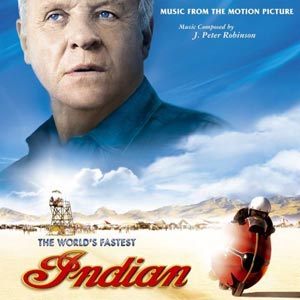World’s Fastest Indian
Music composed, conducted, and produced by J.Peter Robinson
Performed by The Hollywood Studio Symphony Orchestra
Orchestrated by J. Peter Robinson, Paul Buckmaster, Dennis McCarthy, Jon Kull and Larry Rensch
Available on Milan (M2-36146)
Running Time: 44:26
Crotchet Amazon UK Amazon US

The oddly titled The World’s Fastest Indian is a fine small-scale film which is based on a true story about a motorcycle speed record that holds to this day, achieved at the Bonneville Salt Flats by a New Zealander (Anthony Hopkins) on an old motorbike. J. Peter Robinson, a classically trained musician at the Royal Academy of Music in London who began his recording career in London as the pianist for Andrew Lloyd Webber and Tim Rice on Jesus Christ Superstar, has worked on numerous projects before. These include A Man Apart, Fifteen Minutes and mainly horror films like Nightmare Cafe, Return of the Living Dead Part 2 and New Nightmare. Surprisingly for some, but due to his longtime and successful relationship with producer-director Roger Donaldson (including Cocktail and Cadillac Man), he was attached to the scoring duties of this film.
Robinson wrote for a wide and eclectic musical ensemble here, led by piano, oboe and clarinet and accompanied by harp, acoustic guitar, sparse electronics, electric guitar, percussion, electronic percussion and marimbas, and occasionally a full symphony orchestra. The film, as explained in the informative liner notes, was initially scored and recorded on his piano as he viewed it for the first time. Later on, unique instrumentation and arrangements were added so the final score, resulting in a diverse and variegated but also flawed work.
As far as thematic material is concerned, Robinson launches two tender themes that are difficult to define, at least initially. The main theme is a slow, loose and light-hearted piano melody (based on a four-note idea) that gets various renditions during the whole score, its first appearance being on ‘Memories’. An eerily beautiful solo piano passage based upon major / minor chord and arpeggios opens the cue, soon joined by the full orchestra in a smooth, melodic and romantically nostalgic piece. ‘Refusal-Heart Attack’, ‘Sportsman of the Year’ with its beautiful string solos, and the victorious and uplifting ‘Burt's Triumph’, all offer variations of this theme. Moving on, we find an eight-note Latin-flavored marimba motif, strongly echoing Thomas Newman’s American Beauty. Electric and acoustic guitar with smooth rhythmic percussion and orchestra present this theme in ‘Bike Shop’. In ‘Eggs for Fran’ it’s underlined by a heavy electronic hip-hop drum loop.
Another element featured in the score is that of the intense action pieces which accompany several races on screen, and are performed in a unique way. ‘Beach Race’ is the first such piece, led by abrupt dark percussive cuts, violin clusters and violent piano on the lower register mixed with some rousing orchestral writing and marimba/electronic rhythms. Other pieces like ‘Trial Run’ and ‘The World’s fastest Indian’ also fit this mould, aided by rousing percussion, electronics and complex dissonance, all constantly building up. The real gold of this work however lies within the romantic and lush piano with orchestra pieces like the opening ‘Burt and Tom’, ‘Departure’ a sweepingly romantic orchestral passage built on major scales and performed with emphasis on the violins and oboe, clarinet, harp and plucked strings. ‘Disappointment’ and the concluding ‘Back to My Shed’ (which hints of Craig Armstrong) also belong in this category.
All this might sound good on paper but there are a lot of problems with this score. The obvious Thomas Newman references betray a sad lack of originality. It also doesn’t help either that the music here is strongly connected to the movie it accompanies. With constant and abrupt changes between rock to country, jazz and modern minimalism and from classical-oriented orchestral passages with piano and string solos into dark and violent action writing with intense percussion and modern electronics, this is too much for anyone to follow on album. The direct result on CD, despite its value as an accompaniment to the movie, is a particularly complex and incoherent musical experience. I suspect that the producers of the album also noticed this, especially if you take into account the fact that none of the pieces are separated with the usual pause in-between. On the contrary, all of them are sliced-up into fragments of small duration and cross-faded into each other, creating the effect of a very large suite. This results into a subjective flow that makes it hard for the listener to keep up with everything going on. Moreover, this not only happens during the transitions between the very different tracks, but the internal structure of several pieces (see ‘Bonneville Salt Flats’) is also problematic. Yes, Robinson’s score is a strong aid to the movie it accompanies, but that’s probably where it should have stayed.
Demetris Christodoulides
Rating:
2.5
Return to Reviews Index